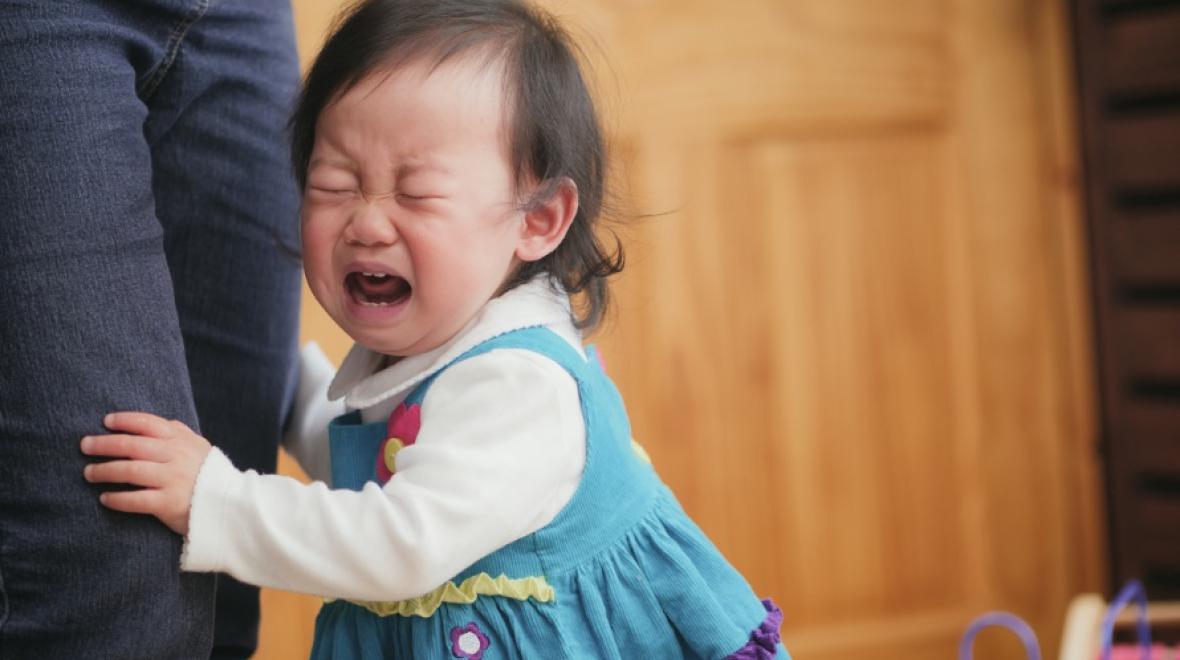
As each school year starts, I notice many parents struggling to handle morning drop-offs. Children are often in tears, and parents, unsure of what to do, vacillate between frustration and guilt.
Parents are ready to start their own day, and after the first few days of challenging drop-offs, we are beginning to lose patience. At the same time, we can feel guilty about leaving upset children behind. When such incidents are witnessed by an audience of seemingly stoic kids and anxiety-free parents, add shame to the list of emotions running wild. Not exactly a stress-free start to the day for anyone involved!
Like most parents, I have had my share of challenging drop-offs. The worst one I can remember was early in my second pregnancy, when my then 2-year-old had just started preschool a couple mornings a week. As I dropped her off, she cried, and I cried; finally, the teacher, bless her, made me leave. I looked back to see my daughter pounding on the window, pleading, “Don’t leave me.” I was sure that I was dooming her to years of therapy. I spent the next three hours contemplating my failures as a mom and doubting my ability to handle two children when I couldn’t handle one.
And then I went to pick my child up. Her teacher, skilled with first-time parents like myself, let me know that my daughter had stopped crying about 20 seconds after I drove away. From then on, my child was a happy camper. She greeted me with smiles and hugs, excited to tell me about her morning at school.
Yes, transitions are hard. Drop-offs can be filled with intense emotions, and they don’t always smooth out by the second day. Whatever the drama, these tips will help ease the stress for you and your child.
Manage your own emotions
The most effective thing parents can do is to manage their own anxiety around the transition. Kids often do fine in new environments and with new routines and schedules. Our children often pick up on our own stress, and this can make the adjustment harder for them. It’s not only okay but perfectly normal to feel nervous about a new school, or to feel sad about how fast your child is growing up. The problem occurs when we project our emotions onto our children or assume they are feeling the same thing we are. Find support for yourself so you can be present for your child’s emotions.
Do a practice run
Most schools will be happy to have you visit with your child before she begins school. Even driving or walking by a few times and pointing out the school building can be helpful. Reading books about school and talking with your child about what she can expect will help her be ready for that first day.
Let them go
It’s tempting to stick around, hoping your child will stop crying. It’s also tempting to sneak out, thinking that by doing so, it will be easier for your child. However, neither of these strategies work well. The long, drawn-out good-byes increase the anxiety in our children, and the quick ducking out plays into their greatest fears about being left. Instead, create a good-bye ritual with your child: Give those last hugs and kisses, and tell him you can’t wait to see him after school. Then, follow through on your word and head out that door.
What if you tried all this and your child still struggles?
Kids are unique beings with their own thoughts and feelings, and no one method will work for all. It may be helpful to take a closer look at your child’s world to see what might be getting in the way of a smooth drop-off.
Temperament
Do you jump headfirst into new situations, while your partner sits back to evaluate before getting involved? Does one of your children hide shyly behind you when meeting new people while your other child is ready to perform his latest feats to any passerby? Temperament refers to the way someone approaches and interacts with his or her world. Differences in temperament can make drop-offs harder or easier, depending on the child.
Antidote: Think about your child and how they approach and adapt to new situations. If your child is slow to warm up to new environments, spend some extra time letting them get comfortable with school. Play on the playground, read in the library and attend school functions to give your child more opportunities to acclimate. Plan to arrive at school a little bit early and create a ritual for easing in, such as reading a book together before you leave. Let your child’s teacher know as well, so that the teacher can work with and support your child as they adjust.
Transitions
While the start of school is a big transition in itself, life is always changing, and there may be other transitions and changes happening in your child’s world that are contributing to her separation anxiety at drop-offs:
Got a new baby in the home?
You made it through baby brother coming home, and big sister has been nothing but delighted to have him around, until it’s time for her to start school. She accepted that the baby gets to sleep in your room and that baby’s dining and diapering needs come first. But now that baby gets to stay home with you while she has to spend the day away, the situation has just gone too far for her, and it can be a recipe for morning mayhem.
Antidote: Create a special ritual to connect with your older child at a different time of day. Spending just 15 minutes alone with that child each day can make all the difference. This should be child-directed time when parents are not distracted by the phone or computer. Aim for a time when two caregivers are home or the little one is napping.
While it’s hard to see your child struggle, giving him and yourself time to adjust is essential.
Moved to a new home or attending a new school?
Big changes like these can be stressful for all involved. If your child is adjusting to a new environment, he can be especially clingy with caregivers. We are the constant, stable force in our children’s lives, so of course, they want to hold on for dear life.
Antidote: Stick to your established routines as much as possible in the new surroundings. This helps increase your child’s feeling that your family is still the same even though the setting may change. If the move is to a new school, help him connect with the location by spending a little extra time with him on the playground after school or reading books in the library. This will increase his comfort with the new environs. You can also help him adjust by finding a new buddy before school starts or using playdates to help your child build connections with his classmates.
Traumatic events
Has a recent loss occurred, such as the death of a loved one or pet? Did your child have a bad experience at a previous school? Whether it’s a recent loss or an early experience, trauma can rear its head at the most inconvenient times. If your child is processing something painful, the last place she wants to be is away from you, particularly in what might be a new environment.
Antidote: Take a deep breath and remember that your child’s feelings are normal. If a loss has occurred, you likely are dealing with your own emotions, which makes it that much harder to see your child in pain. Make sure you are getting support for yourself as well. It’s important to let your child’s teacher and the school know what your child is going through so they can be attentive to her emotional needs.
Whether your child adjusts with ease or struggles early on, making the transition into the new school year is a significant event in your child’s life. While it’s hard to see your child struggle, giving him and yourself time to adjust is essential. It may be bumpy, but your ability to stay calm and model persistence will go a long way toward helping your child do the same.
Editor’s note: This article was originally published in 2015 and updated in September 2021.











